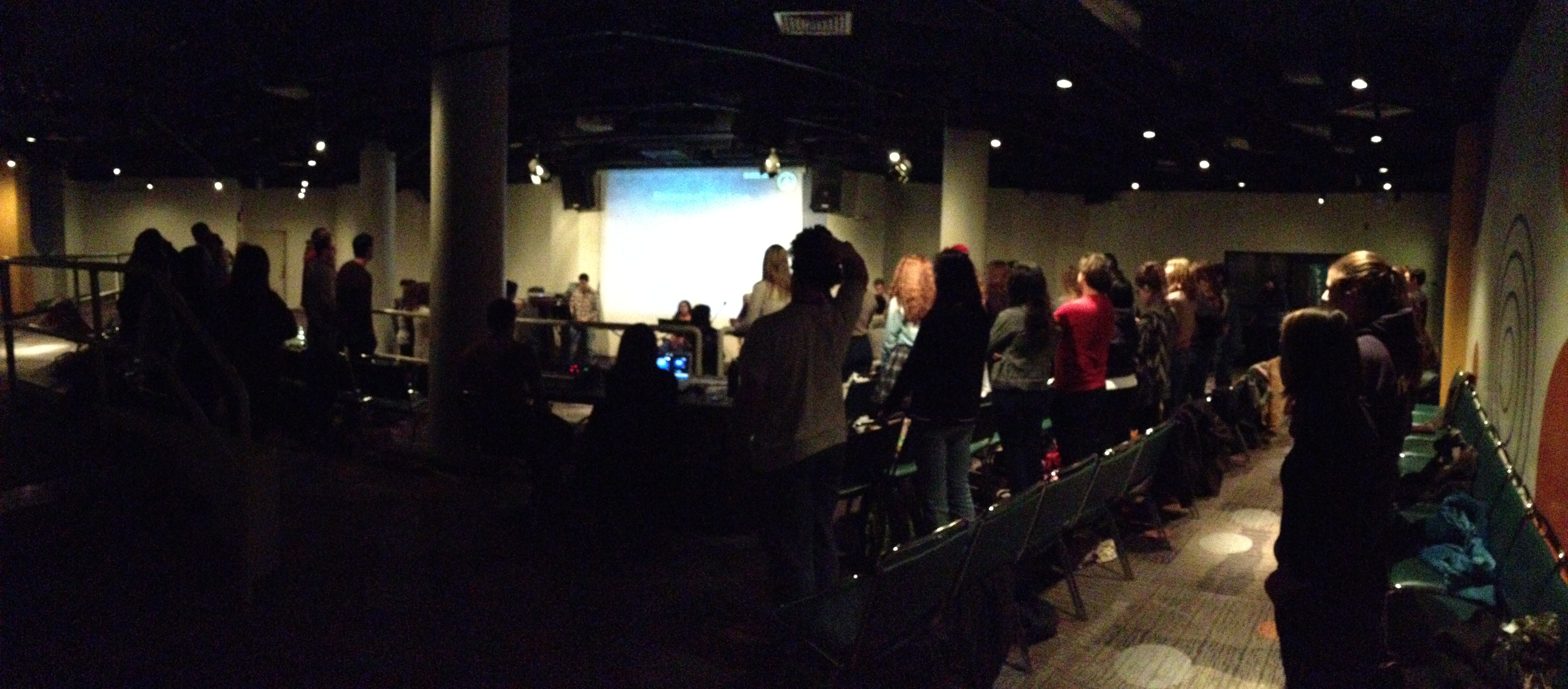Posted by justinfox on May 29, 2014

There’s a lot of talk out there about “self-care”, avoiding burn-out, and leaders leading themselves well. God’s command of Sabbath made the top-10, after all. Sometimes it can be confusing as to what personal steps need to be taken, but here’s a fun, quick test to gauge where you might be at. Look at the chart above and put an X on each box where you have a commitment, work related or otherwise, even if it’s just an hour. If your week’s schedule changes frequently, consider looking back at last week and filling it in that way… The goal is try and carve out at least 3 blocks with no X’s where you are “unavailable” and able to connect and be with God and others, unscheduled and “off the clock”. 15-18 X’s in a week is a healthy balance, but more than that is too much… And, while you’re considering this idea of Sabbath, space, rest, and what to do with the free time you’re blocking out, check out this quick, short blog post on the power of silence.
Read More
Posted by justinfox on Feb 6, 2014
I had the awesome opportunity to speak to college students recently. InterVarsity is a vibrant Christian community on the downtown Richmond campus of VCU, they just began a study through James, and I tackled James 2:1-13 on the subject of “Favoritism”.

Here’s a bit of my outline and notes. I also used a diaper with chocolate mashed up inside it for an illustration…but, I guess you had to be there for that!
There are two sides to favoritism:
1. lifting up the rich and influential
2. putting down the poor and less capable
A. LIFTING UP THE RICH
We can’t be a “respecter of persons” giving special attention to the rich, powerful, and influential. (V.1-5)
– Aren’t they the ones who are exploiting you? (v. 6-7)
– Aren’t they taking you to court?
– Aren’t they making fun of your “name”?
God sees us differently; the ground is level at the foot of the cross / we all need Jesus equally…
Let’s not treat the “cool” people better! WE’RE ALL EQUAL!!!
B. PUTTING DOWN THE POOR
5 Listen, my dear brothers and sisters: Has not God chosen those who are poor in the eyes of the world to be rich in faith and to inherit the kingdom he promised those who love him? 6 But you have dishonored the poor.
Again, God sees differently. WE ARE NOT THE JUDGE, HE IS!
Every single person is a child of God, a divine creature…
Matt. 5:
3 Blessed are the poor in spirit,? for theirs is the kingdom of heaven.
4 Blessed are those who mourn, for they will be comforted.
5 Blessed are the meek,? for they will inherit the earth.
6 Blessed are those who hunger and thirst for righteousness,? for they will be filled.
7 Blessed are the merciful,? for they will be shown mercy.
8 Blessed are the pure in heart,? for they will see God.
9 Blessed are the peacemakers,? for they will be called children of God.
10 Blessed are those who are persecuted because of righteousness,? for theirs is the kingdom of heaven.
“The last will be first, and the first will be last.” The Great Reversal.
I closed this section with one of my favorite C.S. Lewis quotes on the subject. Check it out…
“The load, or weight, or burden of my neighbor’s glory should be laid daily on my back, a load so heavy that only humility can carry it, and the backs of the proud will be broken.
It is a serious thing to live in a society of possible gods and goddesses, to remember that the dullest and most uninteresting person you talk to may one day be a creature which, if you saw it now, you would be strongly tempted to worship, or else a horror and a corruption such as you now meet, if at all, only in a nightmare.
There are no ordinary people.
You have never talked to a mere mortal.
Nations, cultures, arts, civilization—these are mortal, and their life is to ours as the life of a gnat.
But it is immortals whom we joke with, work with, marry, snub, and exploit—immortal horrors or everlasting splendors.
This does not mean that we are to be perpetually solemn.
We must play.
But our merriment must be of that kind (and it is, in fact, the merriest kind) which exists between people who have, from the outset, taken each other seriously—no flippancy, no superiority, no presumption.
And our charity must be real and costly love, with deep feeling for the sins in spite of which we love the sinner—no mere tolerance or indulgence which parodies love as flippancy parodies merriment.
Next to the Blessed Sacrament itself, your neighbor is the holiest object presented to your senses.”
There are no ordinary people…
– Why do this? What’s our motivation?
12 Speak and act as those who are going to be judged by the law that gives freedom, 13 because judgment without mercy will be shown to anyone who has not been merciful. Mercy triumphs over judgment.
MATT. 7:1“Do not judge, or you too will be judged. 2 For in the same way you judge others, you will be judged, and with the measure you use, it will be measured to you.
MERCY TRIUMPHS OVER JUDGEMENT…LET MERCY TRIUMPH!
“One of the most subtle dangers in the church, is that we tend to cater to people that can help us, rather than to those we can help!”
We prefer the rich and powerful because we might “get something” from them.
What if we were so full of God that we never needed anything from anyone?
What if we could go through life with Ps. 23:1 on our lips; “The Lord is my Shepherd, I have all that I need”?
What if we could simply give?
Like Jesus; “who didn’t come to be served, but to serve and to give His life as a ransom for many”
The kind of people Jesus reached out to: Children, prostitutes, loan shark tax collectors, adulterers, criminals…the poor
What if we could follow in His footsteps a bit more in this way?
RESPONSE
I planned an intentional time of responsive prayer to end this, and the band did great in accompanying the time of worship and reflection. I asked these questions and provided lots of space for silence and personal prayer…
– Where in your life have you felt judged – good or bad? What was that like, how did it feel?
– When have you judged others recently?
– Do you struggle more with elevating the rich or devaluing the poor right now in your life?
– What is God saying to you now? What action step is he inviting you toward?
Thank you, IV and VCU! I can’t wait to hang with you guys again!!
Read More
Posted by justinfox on Nov 14, 2013
What does it mean to “join” a church? Is membership important? What does church involvement look like? What are the core values at play, and where do they come from?

Although I won’t attempt to answer all these questions here, I do want to highlight a couple of my favorite scriptures on church participation, and I pray these will be an encouragement for those considering a bigger role in their faith community. I also hope to provide a framework for pastors and leaders as they communicate the value of “joining in” in a deeper way…
“As you come to him, the living Stone—rejected by humans but chosen by God and precious to him— you also, like living stones, are being built into a spiritual house to be a holy priesthood, offering spiritual sacrifices acceptable to God through Jesus Christ.” (1 PETER 2:4-5)
“Present yourselves as building stones for the construction of a sanctuary vibrant with life, in which you’ll serve as holy priests offering Christ-approved lives up to God,” is how The Message paraphrase sums up this passage, and I love the language here! These scriptures tell us that since church members are “living stones” we need everyone involved for the sanctuary to be “vibrant with life.” Vibrant church is not a spectator sport. The Bible calls the church the “body” of Christ…a living, moving, organism where every cell counts.
Peter goes on to say in 2:9-10: “But you are a chosen people, a royal priesthood, a holy nation, God’s special possession, that you may declare the praises of him who called you out of darkness into his wonderful light. Once you were not a people, but now you are the people of God…”
“But you are the ones chosen by God, chosen for the high calling of priestly work, chosen to be a holy people, God’s instruments to do his work and speak out for him, to tell others of the night-and-day difference he made for you—from nothing to something, from rejected to accepted.” (The Message)
This is where we get the phrase “the priesthood of all believers,” and it’s a beautiful picture. Can you imagine it? Everyone getting into the action of God’s work in the world, everyone playing a vital part in the grand story of the Gospel, every church member exercising his or her priestly calling and gifting within their community of faith…this is a picture worth fighting for!
If we agree that this ideal has some validity to it, then the next question is; what would that look like practically? The Bible, once again, paints a portrait to capture our vision and imagination:
1 Corinthians 14:26 …When you come together, each of you has a hymn, or a word of instruction, a revelation, a tongue or an interpretation. Everything must be done so that the church may be built up.”
hmmm…”built up”; interesting picture…with “living stones” maybe?
…and The Message says, “When you gather for worship, each one of you be prepared with something that will be useful for all: Sing a hymn, teach a lesson, tell a story, lead a prayer, provide an insight.”
This is what I like to call an every-member-functioning body, and I believe it is the calling of every church leader to give themselves fully to this vision; facilitating, encouraging, and championing the idea of every person playing their God-given part.
In 20 years of itinerent church ministry experience though, I have yet to see a Sunday morning service look like the verses above. There are many factors, challenges, and reasons for this that are beyond the scope of this article, but there is one place I have experienced it over and over again; small groups. When believers gather together with 10-15 others in community to pray, talk, and support one another, the vibrant colors of Christ’s body begin to reveal themselves in stunning, diverse, tangible ways. It seems the Spirit has used the idea of community to grow us in Christ since the beginning. We were created by a God who’s nature is community (the three-in-one; Trinity), and this is how we’ve been wired. Community is one of God’s primary “means of grace” to draw us to Himself and form us into the image of Christ.
Fred Buechner says, “You can survive on your own; can grow strong on your own; prevail on your own; but you cannot become human on your own.”
Dietrich Bonhoeffer, a contemporary martyr who was executed for his faith at the hands of Hitler’s regime, wrote a short, powerful book on community called Life Together, and in it he distills our true connection to each other. He writes, “Our community with one another consists solely in what Christ has done to both of us. This is true not merely at the beginning, as though in the course of time something else where to be added to our community; it remains so for all the future and to all eternity. I have community with others and I shall continue to have it only through Jesus Christ. The more genuine and the deeper our community becomes, the more will everything else between us recede, the more clearly and purely will Jesus Christ and his work become the one and only thing that is vital between us. We have one another only through Christ, but through Christ we do have one another, wholly, and for all eternity.”
So let’s dive in. Let’s not miss the treasure in each other. Let’s not miss the reward of fully participating in our fellowships. Let’s not miss the tapestry of gifts woven throughout our congregation.
As a songwriter and worship leader, with the notes and rhythms of music coursing through my veins, I find myself drawn to orchestral images, and Dietrich gets me once again with this;
“God has prepared for Himself one great song of praise throughout eternity, and those who enter the community of God join in this song.”
Let’s sing, friends!
Read More










